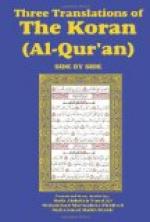The fault appears, however, to lie partly in our difficulty to appreciate the psychology of the Arab prophet. We must, in order to do him justice, give full consideration to his temperament and to the condition of things around him. We are here in touch with an untutored but fervent mind, trying to realise itself and to assimilate certain great truths which have been powerfully borne in upon him, in order to impart them in a convincing form to his fellow-tribesmen. He is surrounded by obstacles of every kind, yet he manfully struggles on with the message that is within him. Learning he has none, or next to none. His chief objects of knowledge are floating stories and traditions largely picked up from hearsay, and his over-wrought mind is his only teacher. The literary compositions to which he had ever listened were the half-cultured, yet often wildly powerful rhapsodies of early Arabian minstrels, akin to Ossian rather than to anything else within our knowledge. What wonder then that his Koran took a form which to our colder temperaments sounds strange, unbalanced, and fantastic?
Yet the Moslems themselves consider the book the finest that ever appeared among men. They find no incongruity in the style. To them the matter is all true and the manner all perfect. Their eastern temperament responds readily to the crude, strong, and wild appeal which its cadences make to them, and the jingling rhyme in which the sentences of a discourse generally end adds to the charm of the whole. The Koran, even if viewed from the point of view of style alone, was to them from the first nothing less than a miracle, as great a miracle as ever was wrought.
But to return to our own view of the case. Our difficulty in appreciating the style of the Koran even moderately is, of course, increased if, instead of the original, we have a translation before us. But one is happy to be able to say that Rodwell’s rendering is one of the best that have as yet been produced. It seems to a great extent to carry with it the atmosphere in which Muhammed lived, and its sentences are imbued with the flavour of the East. The quasi-verse form, with its unfettered and irregular rhythmic flow of the lines, which has in suitable cases been adopted, helps to bring out much of the wild charm of the Arabic. Not the least among its recommendations is, perhaps, that it is scholarly without being pedantic that is to say, that it aims at correctness without sacrificing the right effect of the whole to over-insistence on small details.
Another important merit of Rodwell’s edition is its chronological arrangement of the Suras or chapters. As he tells us himself in his preface, it is now in a number of cases impossible to ascertain the exact occasion on which a discourse, or part of a discourse, was delivered, so that the system could not be carried through with entire consistency. But the sequence adopted is in the main based on the best available historical and literary evidence; and in following the order of the chapters as here printed, the reader will be able to trace the development of the prophet’s mind as he gradually advanced from the early flush of inspiration to the less spiritual and more equivocal r\oc\le of warrior, politician, and founder of an empire.




